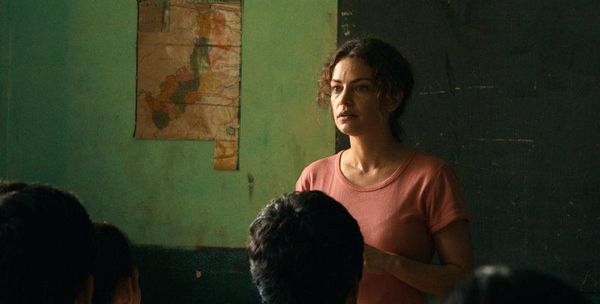Eye For Film >> Movies >> Paulina (2015) Film Review
Paulina
Reviewed by: Jennie Kermode

How should a woman situate herself in relation to the violence in the world around her? Does it make any difference if she's already experienced violence or not? What is the proper response to suffering and whom should it prioritise? These are some of the questions raised by Santiago Mitre's remake of the Daniel Tinayre classic. With 56 years having passed between the two, there's quite a bit of cultural change to take into account, but what really hit home are the parts that haven't changed at all.
One thing that has is the location. Buenos Aires slums no longer chill the blood of the middle classes in quite the same way, so now our heroine, the eponymous Paulina (Dolores Fonzi), chooses to go and work at a school in a semi-rural area near the Paraguayan border. She doesn't have to - she's a promising young law student with lots of opportunities, as her influential father points out - but she wants to make a difference and gain a deeper understanding of how the other half live. of course it's not the same while one retains the option of turning round and going back to a life of comfort, but Paulina approaches her work with a determination that wins her respect from her colleagues even if it's slow to engage the students. And where she has privilege in some ways, she lacks it in others.

She's not the woman the boys were waiting for, but she's a woman, and she'll do. Masculine pride has been affronted; a female body acts as a substitute on which to take out rage. The rape is brutal; it's also socially complex. Not all the boys want to be there. They're alert to Paulina's pain; it feels wrong in a way they weren't prepared for. The film doesn't excuse them through this, but it complicates the issue of guilt and, in so doing, makes us alert to the ways in which other male characters in the film are also guilty of abusing their power.
The focus of the film isn't on the rape itself, and it isn't on Paulina's suffering. She does everything by the book, the way victims are told to - everything except for going through an emotional collapse. This difference marks her out like a man failing to cry at his mother's funeral. She challenges something fundamental simply by continuing to exist on her own terms. It's a response which is devastating to those around her.
Mitre's film explores issues around the ownership of experience. Is the rape primarily Paulina's business, or is its impact on her father and boyfriend equally important? How do the decisions she makes afterwards affect other rape survivors and what responsibilities does she have towards all these people? What would supporting her really mean?
Fonzi's performance is perfectly judged; she knows when to hold back, convincing us of her character's sanity, and yet we never lose sight of her strength, of her power. Early on in the film, talking about democracy, Paulina asks her students "Who has the power?" As she reclaims her life, it's a question the film keeps returning to.
Unfussily directed but with a long final shot that shows us just what the director and star are capable of, this is a potent update which stands up proudly in its own right.
Reviewed on: 01 Feb 2016















